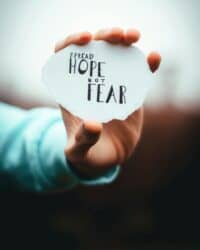An Electronic Mental Health Newsletter from Joel I. Kimmel, Ph.D., P.A. & Associates Volume 19, Number 5
In our society today, there is a lot of anger that stems directly from feeling hopeless. But being hopeful can improve both your physical and mental health.
Hope is more than just wishful thinking—it is a powerful, driving belief that you can overcome adversity, persevere, and ultimately succeed. It’s not simply an attitude; it’s the deep determination to push through emotional and situational barriers and begin again when necessary.
In the face of challenging circumstances, it is often hope that carries people through. Those who have endured life’s darkest moments frequently credit their survival to maintaining a sense of hope.

Without hope, people may become passive, pessimistic, and overwhelmed by despair. They feel powerless, surrender to misfortune, and struggle to move forward.
But hopeful individuals are energized, optimistic, and resilient. They take action, draw strength from within or from a higher power, and express gratitude even in difficult times. They show kindness, connect with others, and make meaningful efforts to help those around them.
Hope helps people set goals, plan how to achieve them, and stay motivated to follow through.
Hope isn’t just emotional—it’s also practical. Research shows that it plays a key role in physical and mental well-being. Dr. Anthony Scioli found that high levels of hope are one of the strongest predictors of overall well-being. People with hope recover faster from illness, adopt healthier behaviors, and experience fewer symptoms of depression, trauma, and anxiety.

In therapy, building hope is often a central goal, helping individuals create a more fulfilling and resilient life.
In addition, make sure to read Dr. Kimmel’s latest blog, Embracing The Summer Season! here .
What to Know
- Hope is a belief—not just a wish—that things will get better
- It transforms people from victims to survivors
- It empowers action and perseverance through life’s toughest moments
- The absence of hope can lead to despair, depression, and hopelessness
- Hope differs from optimism: optimism is an attitude, while hope drives action
- Therapy can help restore and grow hope in those who feel lost
- Hope supports recovery from illness and fosters healthy behaviors
- Hopeful individuals report greater happiness, purpose, and life satisfaction
- Hope can be developed—it’s a skill, not just an emotion
️ What to Do
- Believe that the future can improve
- Acknowledge hope’s power in healing and overcoming adversity
- Eliminate self-doubt—use empowering language like “I can” and “I will”
- Lean on supportive family and friends
- Surround yourself with positivity and uplifting influences
- Listen to inspirational podcasts, music, or speakers
- Set short- and long-term goals—and work toward them
- Don’t give up. View failure as feedback, not defeat
- Seek professional support if you struggle to maintain hope
We’re Here to Help
If you’re feeling overwhelmed or hopeless, you don’t have to face it alone.
Call us: 954-755-2885
Email: DrKimmel@KimmelPsychology.com
Visit us: www.Kimmelpsychology.com
Joel I. Kimmel, Ph.D., P.A. and Associates
5551 N University Drive, Suite 202
Coral Springs, FL 33067
As always, we are interested in your thoughts. If you would like to respond to this e-Letter, email your comments to DrKimmel@Kimmelpsychology.com
and we will publish them next month.
Till June…
The information provided in this electronic newsletter is not a substitute for professional treatment. It is the opinions of the writers and is provided solely for educational purposes. For mental health care, seek a qualified professional.
If you no longer wish to receive future e-Letters, please unsubscribe or send an email to DrKimmel@Kimmelpsychology.com requesting to be removed from this list.
If you find this information interesting or helpful, please forward this e-Letter to your contacts and friends.
Copyright © 2025 by Joel I. Kimmel, Ph.D., P.A. and Associates










